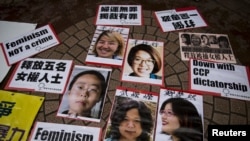Chinese police have broadened their investigation into five women's rights activists who were detained last month. In the meantime, their continued detention has drawn criticism abroad.
Several of China’s most prominent women activists remain in jail in Beijing waiting for prosecutors to decide whether they will be formally arrested or released. The women were planning a demonstration against sexual harassment when they were detained last month in advance of International Women’s Day.
“The police have now requested their formal arrest, and prosecutors will now have up to a week to decide their formal arrest or to release them and send the case back for further investigation," says Maya Wang, a China researcher with Human Rights Watch. "And if they do approve the formal arrest in the Chinese system, that will almost certainly lead to conviction.”
Police have reportedly changed their charge against the women, accusing them of causing public disorder in their earlier campaigns for women's rights, rather than the charge of “picking quarrels and provoking trouble” for planning to afix stickers on buses and trains to protest harassment of women on public transportation.
The women — Li Tingting, Wei Tingting, Wang Man, Zheng Churan, and Wu Rongrong — have organized public demonstrations for several years in support of women’s rights. Two of the women have been hospitalized during their detention. One suffered a mild heart attack and the other was denied medication for a liver condition.
“She was forced to sleep on the floor of the detention center instead of on the bed, and all of them were subject to very intensive interrogations, sometimes into the evening, having very little sleep,” said Maya Wang.
Some of the women had previously launched a "Bloodstained Bride" campaign, during which they had posed in red-stained wedding dresses to draw attention to domestic violence. Equality for women has been a cause long supported by China’s Communist Party, and authorities had turned a blind eye to women's groups’ previous demonstrations. Wang says the activists’ detention is indicative of China’s broader crackdown on civil society.
“This kind of signifies a move by authorities to tighten the space allowed for civil society which has been going on under the leadership of President Xi Jinping, and this really signifies that previously tolerated activities that are now no longer allowed,” she said.
The women's continued detention has drawn international condemnation. This week, former U.S. secretary of state Hillary Clinton tweeted, "The detention of women's activists in China must end. This is inexcusable.”
Britain and the U.S. ambassador to the U.N., Samantha Power, have also spoken out against the women’s arrests.







